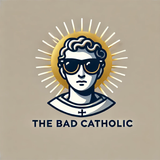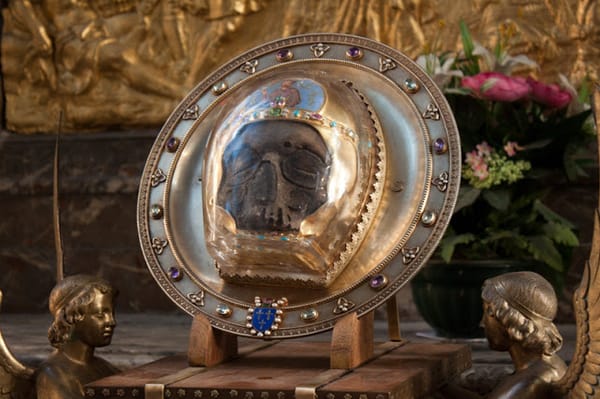Can Catholics Support the Death Penalty?

By now, you’ve probably heard about the tragic stabbing of a Ukrainian refugee, Iryna Zarutska, on a train, which sadly resulted in her death.
The incident happened in August of 2025, and the video from the train’s security cameras leaked onto social media about a month later.
The full video is horrific, and I won’t post it here, but you can easily find it online. A word of warning—it’s extremely graphic and heartbreaking.
President Trump and many people are calling for the death penalty for the killer, identified as Decarols Brown Jr, which is on the table according to ABC News.
Decarlos Brown Jr., 34, who was arrested on Aug. 22 after he fatally stabbed 23-year-old Iryna Zarutska, was charged by the U.S. Attorney's Office in the Western District of North Carolina with committing an act causing death on a mass transportation system, which could make him eligible for the death penalty, the Department of Justice said Tuesday.
As you can imagine, this story has dominated social media for the last few days. Most people on Twitter (I refuse to call it X) fully support the ultimate punishment for Mr. Brown.
However, I’ve seen a few comments on Catholic Twitter about the Church’s stance on the death penalty and whether we as faithful Catholics can support it.
Full disclosure: I’m not opposed to the death penalty, but the Church’s position has, in many Catholics' minds, been confusing as of late.
So, what’s the deal? What is the official Church position, and can you be a faithful Catholic and support the death penalty?
One more disclosure before I get into it: I’m not a theologian nor an expert on Church doctrine. I—like a lot of Catholics today—am trying to figure out exactly what the magisterium teaches and adhere to it to the best of my ability.
So, historically, the Catholic Church acknowledged the legitimacy of the death penalty when carried out by proper civil authorities for the sake of justice and protection of the common good. Think about the time during the Inquisition. While the Church didn’t execute people found guilty of heresy, they had no problem handing them over to civil authorities who meted out that punishment.
The early Church fathers also held to this position. St. Augustine said:
Since the agent of authority is but a sword in the hand, and is not responsible for the death he deals, it is in no way contrary to the commandment, ‘Thou shalt not kill,’ to wage war at the bidding of God, or of any ruler under whose authority he serves. … The same divine law which forbids killing allows certain exceptions, as when God authorizes killing by a general law or when He gives an explicit commission to an individual for a limited time. (City of God, Book 1, ch. 21)
Thomas Aquinas puts it this way:
It is permissible to kill a criminal if this is necessary for the welfare of the whole community. … Therefore, if a man be dangerous and infectious to the community, on account of some sin, it is praiseworthy and advantageous that he be killed in order to safeguard the common good. (Summa Theologiae, II-II, q. 64, a. 2)
And the Catechism of the Council of Trent taught that the execution of criminals by civil authority is not contrary to the Fifth Commandment, since the civil authority “is the minister of God, revenger to execute wrath upon him that doth evil.”
In short, the traditional view has always been that the state had the right to execute offenders, provided it was just, proportionate, and aimed at protecting society.
But then we move into the modern era and see Popes like John Paul II, Benedict XVI, and Pope Francis seemingly reverse the traditional teaching.
JPII in Evangelium Vitae writes:
It is clear that, for these purposes [defense of society], the nature and extent of the punishment must be carefully evaluated and decided upon, and ought not to go to the extreme of executing the offender except in cases of absolute necessity: in other words, when it would not be possible to otherwise defend society. Today, however, as a result of steady improvements in the organization of the penal system, such cases are very rare, if not practically non-existent.
The Catechism has even been changed to reflect this shift in doctrine. The 1992 edition allows for the death penalty in principle, but says it should be rare, if not practically non-existent.
The 2018 version (revised under Pope Francis) reads:
The Church teaches, in the light of the Gospel, that ‘the death penalty is inadmissible because it is an attack on the inviolability and dignity of the person,’ and she works with determination for its abolition worldwide.
Frances also reaffirmed this teaching in Fratelli Tutti
The death penalty is inadmissible, and the Church is firmly committed to calling for its abolition worldwide.
To those looking in from outside, see the Church as changing doctrine, which Catholics have always maintained it can’t do. For example, a Pope cannot come out today and declare that Jesus’ resurrection was a spiritual one instead of a physical one.
It’s confusing to be sure, and Catholic philosopher Ed Feser sums it up nicely.
An irony is that John Paul’s Catechism was issued to clarify matters of doctrine, and finally put a halt to post–Vatican II speculation that Catholic teaching was open to endless revision. Yet now we have had two revisions to the Catechism’s own teaching on capital punishment—one in 1997, under John Paul himself, and another under Francis.
Feser goes on to say:
If capital punishment is wrong in principle, then the Church has for two millennia consistently taught grave moral error and badly misinterpreted scripture. And if the Church has been so wrong for so long about something so serious, then there is no teaching that might not be reversed.
From all this, it’s clear to me at least, that whether you support or oppose capital punishment, it is permissible as far as the Church is concerned, and no pope can reverse it.
Where the confusion comes in is when people think that every utterance from the pope is infallible—it is not, especially when it contradicts long-held Church teaching.
Feser sums it up perfectly.
If Pope Francis is really claiming that capital punishment is intrinsically evil, then either scripture, the Fathers and Doctors of the Church, and all previous popes were wrong—or Pope Francis is. There is no third alternative. Nor is there any doubt about who would be wrong in that case.
So, if you’re worried that supporting the death penalty makes you a bad Catholic in light of what Pope Francis said, relax, you’re not in danger of losing communion with Rome.
Ave Maria!





